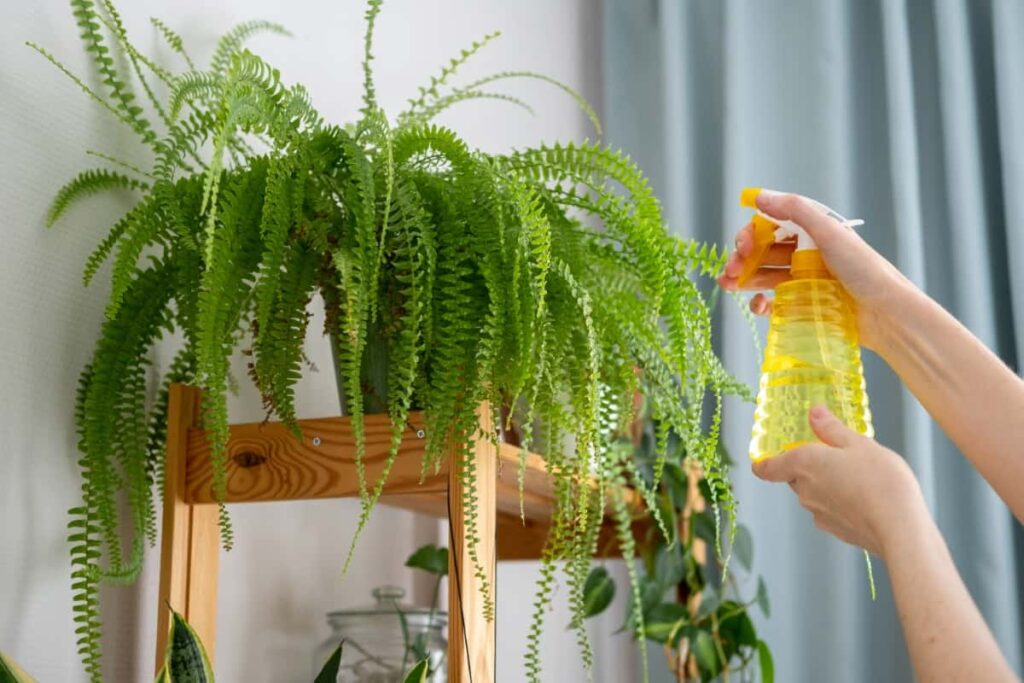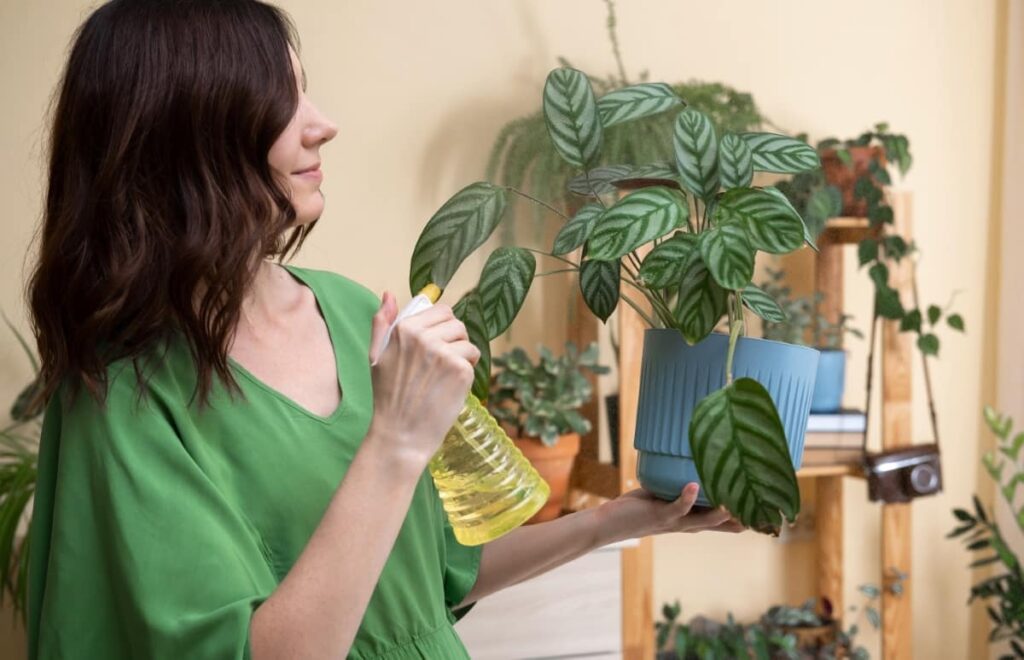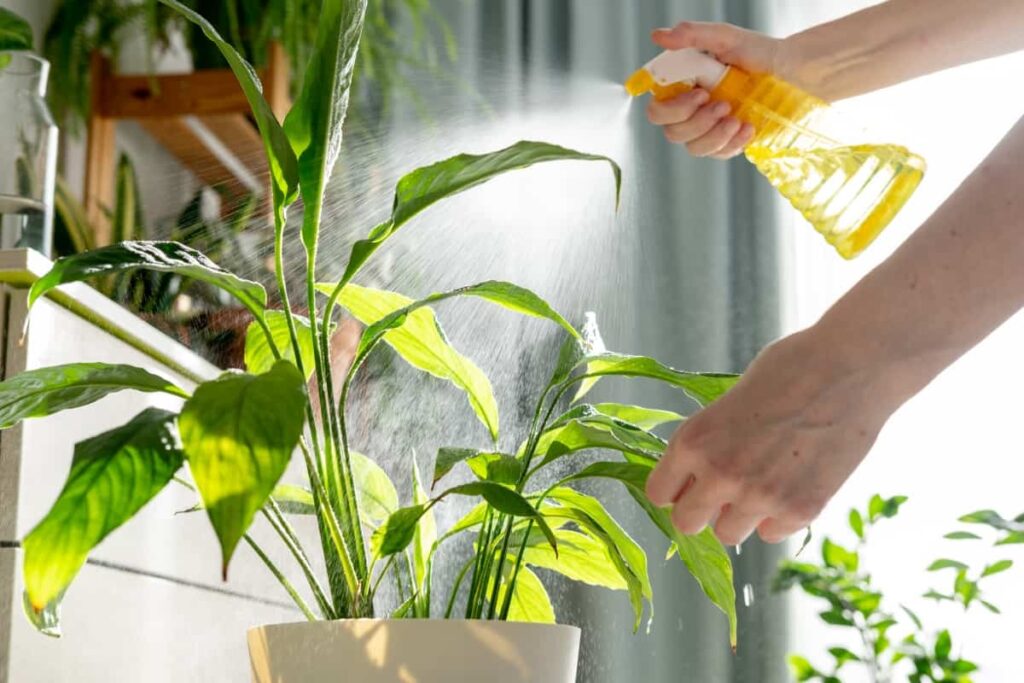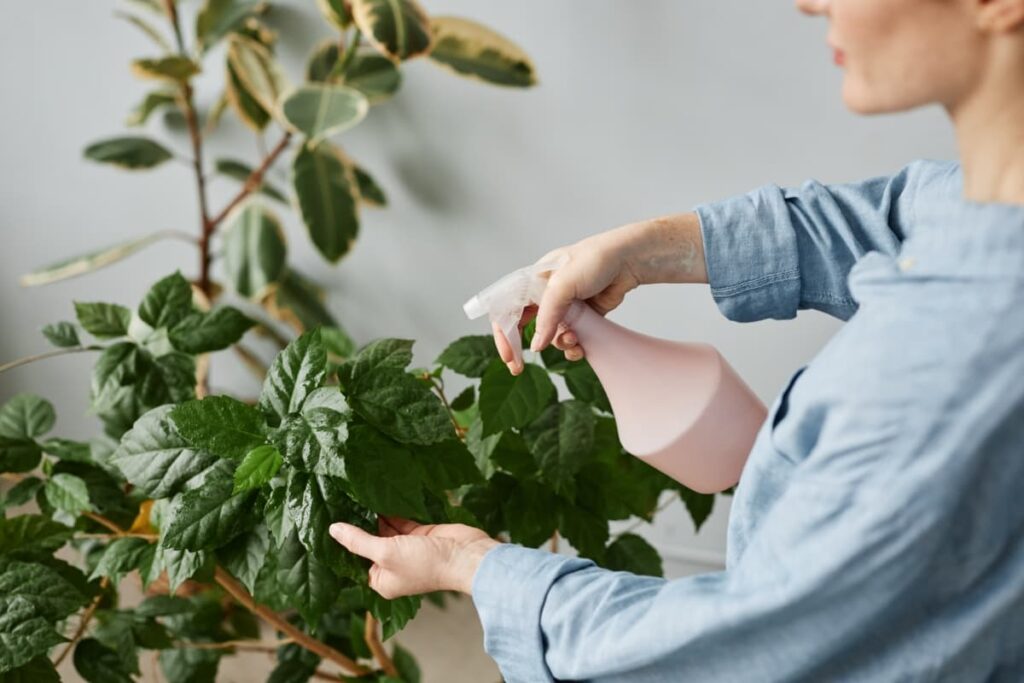Indoor plants bring beauty and freshness to our living spaces, but they can also attract pests such as aphids, spider mites, and whiteflies. While chemical pesticides can effectively eliminate these pests, they may also harm the environment, pets, and even humans. Fortunately, there are natural alternatives that are as effective and safer to use. In this guide, we’ll explore the ten best Natural insecticides for houseplants, along with their benefits, application methods, and safety precautions.

10 Best Natural Pesticides for Indoor Plants
Neem Oil Solution
As one of the organic pesticides for indoor gardening, neem oil has long been used as a natural pesticide. It has compounds that disrupt the life cycle of insects, making it effective against a wide range of pests, including aphids, mealybugs, and scales.
Benefits and Application Methods
- It acts as an insect growth regulator, preventing pests from molting and reproducing.
- To make this safe indoor plant spray, mix one to two teaspoons of neem oil with one liter of warm water and a few drops of dish soap to emulsify the oil.
- Spray the diluted neem oil solution onto the foliage of your indoor plants, covering both the tops and undersides of the leaves.
- Reapply the neem oil solution every one to two weeks or as needed, especially after watering or rainfall.
Soap and Water Spray
A solution of soap and water can effectively control soft-bodied pests like aphids, spider mites, and whiteflies. The soap disrupts the pests’ cell membranes, causing them to dehydrate and die.
Mixing Ratios and Usage Instructions
- To make this DIY plant bug spray, mix two teaspoons of liquid dish soap (preferably mild, non-detergent) with one liter of water in a spray bottle.
- Shake the bottle to ensure thorough mixing.
- Spray the soap solution onto the affected plants, focusing on the areas where pests are present.
- Avoid spraying during the hottest part of the day to prevent leaf burn.
- Repeat the application every few days until the pests are eliminated.
Diatomaceous Earth (DE)
It is a natural powder made from fossilized diatoms, microscopic algae with hard shells. It works by mechanically damaging the exoskeletons of insects, causing them to dry and die.
How to Apply for Best Results
- To use this homemade insect repellent for plants, sprinkle a layer of diatomaceous earth (DE) on the soil surface around your indoor plants.
- Use a duster or brush to apply the powder to the foliage, ensuring thorough coverage.
- Reapply the diatomaceous earth after watering or rain, as it can lose effectiveness when wet.
- Exercise caution when applying diatomaceous earth, as it can irritate the eyes and respiratory system if inhaled.
Cinnamon Powder
Cinnamon powder not only adds flavor to your favorite recipes but also serves as a natural fungicide and insect repellent for indoor plants. It has compounds that inhibit fungal growth and repel pests like ants and gnats.
Uses for Fungus Prevention and Soil Health
- Cinnamon powder should be sprinkled on the soil surface to prevent damping off disease and other fungal infections.
- To make this non-toxic pest solution for houseplants, cinnamon powder should be mixed with water to create a paste, then applied to cuts or wounds on plant stems to promote healing and prevent disease.
- Scatter cinnamon powder around the base of your indoor plants to deter ants and other crawling insects.
Garlic Spray
Garlic has long been prized for its culinary uses, but it also has potent insecticidal properties. As a pet-safe plant pest control, garlic contains sulfur compounds that repel pests and disrupt their feeding behavior.
Preparation and Pest Control Properties
- Crush some cloves of garlic and steep them in hot water for at least 24 hours to extract the active compounds.
- Strain the garlic-infused water and transfer it to a spray bottle.
- Spray the garlic solution onto the foliage of your indoor plants, paying special attention to areas where pests are present.
- Reapply the garlic spray every week or after rainfall to maintain its effectiveness.
In case you missed it: Top 12 Best Pet-Friendly Indoor Plants: Exploring Safe Indoor Plants for Cats, Dogs, and Other Animals

Chili Pepper Spray
Chili pepper spray is another natural pesticide that can effectively deter pests like aphids, thrips, and caterpillars. The capsaicin compound found in chili peppers causes irritation and discomfort to insects, making them less likely to feed on treated plants.
Recipe and Safety Measures
- Blend one or two hot chili peppers with a quart of water in a blender until smooth.
- Strain the solution through a fine mesh sieve or cheesecloth to remove solid particles.
- Add some dish soap liquid to the chili pepper solution to help it adhere to plant surfaces.
- Spray the solution onto your indoor plants, making sure to cover all parts of the foliage.
- When handling chili peppers, wear hand gloves and avoid touching your face or eyes, as this can cause irritation and burning.
Essential Oils Blend
Essential oils are plant extracts in concentrated forms that contain compounds with insecticidal, fungicidal, and repellent properties. Combine various essential oils to create a powerful herbal pesticide for indoor plants.
Effective Oil Combinations and Application Tips
- To make this eco-safe houseplant bug killer, mix several drops of essential oils like peppermint, lavender, tea tree, and eucalyptus with a carrier oil like neem or jojoba oil.
- Add some dish soap liquid to the oil mixture to help it emulsify with water.
- Dilute the oil mixture with water in a spray bottle and shake well before use.
- Spray the solution onto your indoor plants, taking care to cover the leaves thoroughly.
- Reapply the essential oil blend every one to two weeks or as needed for ongoing pest control.
Vinegar Solution
Vinegar is a versatile household ingredient that can be used to create a natural pesticide for indoor plants. Its acidic nature acts as a natural fungus treatment for houseplants to control fungal diseases and deter pests like gnats and fruit flies.
Dilution Guidelines for Pest Management
- Mix equal parts of vinegar (white or apple cider) and water in a spray bottle.
- Optionally, add a few drops of liquid dish soap to enhance the solution’s effectiveness.
- Shake the spray bottle before spraying it onto your indoor plants.
- Use caution when applying vinegar solution to sensitive plants, as it can cause leaf burn in high concentrations.
- Test the solution on a small area of the plant first and dilute it further if necessary.
Baking Soda Fungicide
Baking soda is a household ingredient that can help control fungal diseases on indoor plants. It works by altering the pH of the plant’s environment, making it less hospitable to fungi.
Formula and Application for Fungal Diseases
- Mix baking soda (one to two teaspoons) with one liter of water in a spray bottle.
- Add some dish soap liquid to help the solution adhere to plant surfaces.
- Shake well the spray bottle to dissolve the baking soda before spraying it onto your indoor plants.
- Focus on areas where fungal infections are present, such as powdery mildew on leaves or stems.
- Reapply the baking soda fungicide every one to two weeks until the fungal infection is under control.
In case you missed it: Top 10 Fertilizers for Treating Yellow Leaves in Indoor Plants

Milk Spray
Milk spray is an effective and environmentally friendly plant care solutions that helps control bugs while also promoting plant health and preventing diseases.
Benefits for Plant Health and Disease Prevention
When diluted with water (typically a 50/50 ratio), milk spray forms a protective coating on the leaves, making it difficult for pests to feed on them. Additionally, the proteins and enzymes present in milk have antifungal properties, reducing the risk of plant diseases. Regular application of milk spray can strengthen the plant’s immune system and improve its overall health, making it less susceptible to pest infestations and other issues.
In case you missed it: Fertilizer Schedule Chart for Indoor Plants: Season-wise Homemade, Organic, Natural, and Liquid Fertilizer Calendar

Conclusion
Natural pesticides are a great option for indoor plant pest control without harming the environment or your health. By incorporating chemical-free insect control for houseplants care routine, you can effectively control pests and keep your plants healthy and thriving.
- Management Pests and Diseases in Your Cotton Field
- Sheep Farming Business Plan for Beginners
- Aquaponic Farming at Home: A Step-By-Step Guide
- Profitable Village Farming Business Ideas in 2024
- High-Yield Aquaculture: Fast-Growing Fish for Farming
- Effective Fish Pond Construction Techniques for Beginners
- Irrigation and Water Management in Pineapple Farming
- Blossom to Harvest: Mastering Flowering and Pollination in Papaya Farming
- Pig Fattening Essentials: From Selection to Sale for Beginners
